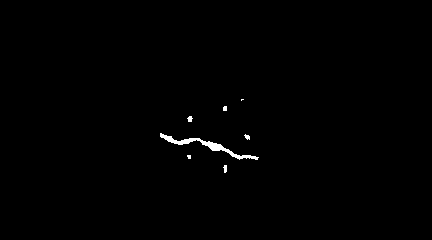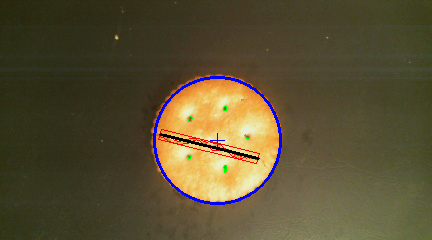This forum is disabled, please visit https://forum.opencv.org
 | 1 | initial version |
As I said, I would not use hough but simpler blob detection or contours with stats. Below is my implementation, this is my result:
Console output
BISCUIT STATS:
Area [px^2]: 12386
Axis[px]: 125.292/126.988
Axis Ratio: 0.986644
Circularity: 0.870751
Abs(eccentricity): 0.621218
Cracks Found! Biggest size: 100.896px (79.4533%)
Internal processing

Result

The code (maybe I'll come back with some explains)
struct contourStats{
double area, perimeter, axisMin, axisMax, axisAvg, eccentricity, axisRatio, circularity;
Point2d center;
RotatedRect rr;
contourStats(){}
contourStats(const vector<Point> &contour)
{
calculateStats(contour);
}
void calculateStats(const vector<Point> &contour)
{
Moments m = cv::moments(contour, true);
area = m.m00;
center = Point2f(-1, -1);
if (area > 0){
center.x = cvRound(m.m10 / m.m00);
center.y = cvRound(m.m01 / m.m00);
}
eccentricity = DBL_MAX;
if ((m.m20 + m.m02) > 0)
eccentricity = (pow((m.m20 - m.m02), 2) - 4 * m.m11 * m.m11) / pow((m.m20 + m.m02), 2);
// axis ratio:circles have ratio=1 lines have ratio->0
rr = minAreaRect(contour);
axisMin = min(rr.size.height, rr.size.width);
axisMax = max(rr.size.height, rr.size.width);
axisAvg = (axisMin+axisMax) / 2.0;
axisRatio = axisMax > 0 ? axisMin / axisMax : 0;
perimeter = arcLength(contour, false);
circularity = perimeter > 0 ? 4 * CV_PI * area / pow(perimeter, 2) : 0;
}
void printStats(const string &title)
{
cout << endl << title << endl
<< "\tArea [px^2]: " << area << endl
<< "\tAxis[px]: " << axisMin << "/" << axisMax << endl
<< "\tAxis Ratio: " << axisRatio << endl
<< "\tCircularity: " << circularity << endl
<< "\tAbs(eccentricity): " << abs(eccentricity) << endl;
}
};
int main(int argc, char** argv)
{
Mat src, gray, edges, cracks,tmp;
Mat biscuitMask;
//src = imread("../img/biscotto_rotated.jpg");
src = imread("../img/biscotto.jpg");
cvtColor(src, gray, CV_BGR2GRAY);
// GET ALL EDGES (CRACKS AND BISCUIT)
Canny(gray, edges, 100, 200, 3);
Morph(edges, edges, MORPH_CLOSE, MORPH_ELLIPSE, 5);
// GET THE BISCUIT ONLY
GaussianBlur(gray, gray, Size(7, 7), 0);
threshold(gray, biscuitMask, 0, 255, THRESH_OTSU);
// VALIDATE THE BISCUIT
vector<vector<Point> > contours;
biscuitMask.copyTo(tmp);
findContours(tmp, contours, CV_RETR_LIST, CV_CHAIN_APPROX_SIMPLE);
if ((contours.size() > 1) || (contours[0].size() < 6)) {
cerr << "ERROR: invalid mask for the biscuit!";
return 1;
}
vector<Point> biscuitContour(contours[0]);
contourStats theBiscuit(biscuitContour);
theBiscuit.printStats("BISCUIT STATS:");
if (theBiscuit.circularity < 0.85) {
cout << "WARNING: invalid biscuit circularity!";
}
drawMarker(src, theBiscuit.center, CL_BLU, MARKER_CROSS, theBiscuit.axisAvg / 8);
circle(src, theBiscuit.center, theBiscuit.axisAvg / 2, CL_BLU, 2);
//polylines(src, biscuitContour, true, CL_GREEN);
// GET ONLY THE CRACKS INSIDE THE BISCUIT
Morph(biscuitMask, biscuitMask, MORPH_ERODE,MORPH_ELLIPSE, 5);
cracks = (edges & biscuitMask);
imshow("cracks", cracks);
findContours(cracks, contours, CV_RETR_LIST, CV_CHAIN_APPROX_SIMPLE);
double minLenght = theBiscuit.axisAvg / 2;
double maxLenght = 0;
int biggest = -1;
vector<contourStats> crackStats(contours.size());
for (size_t i = 0; i < contours.size(); i++)
{
drawContours(src, contours, i, CL_GREEN, 1); //all contours in GREEN
crackStats[i].calculateStats(contours[i]); //analize potential cracks
if (crackStats[i].axisMax < minLenght) //ignore short contours
continue;
drawContours(src, contours, i, CL_RED, 1); //longer contours are cracks
if (crackStats[i].axisMax > maxLenght) // get longest crack
biggest = i;
}
// DRAW AROUND BIGGER CRACKS
if (biggest > 0) {
cout << "Cracks Found! Biggest size: " << crackStats[biggest].axisMax <<
"px (" << 100 * crackStats[biggest].axisMax / theBiscuit.axisMax << "%)"
<< endl;
RotatedRect rr = crackStats[biggest].rr;
Point2f rect_points[4];
rr.points(rect_points);
//draw enclosing rectangle
for (int j = 0; j < 4; j++)
line(src, rect_points[j], rect_points[(j + 1) % 4], CL_RED, 1, 8);
//draw major axis
Point2f pt0 = (rect_points[0] + rect_points[3]) / 2.0;
Point2f pt1 = (rect_points[1] + rect_points[2]) / 2.0;
Point2f pt2 = (rect_points[0] + rect_points[1]) / 2.0;
Point2f pt3 = (rect_points[2] + rect_points[3]) / 2.0;
double axis1 = norm(pt0 - pt1);
double axis2 = norm(pt2 - pt3);
if (axis1>axis2)
line(src, pt0, pt1, CL_BLACK, 2);
else
line(src, pt2, pt3, CL_BLACK, 2);
}
imshow("Src", src);
waitKey(0);
return 0;
}
 | 2 | No.2 Revision |
As I said, I would not use hough but simpler blob detection or contours with stats. Below is my implementation, this is my result:
Console output
BISCUIT STATS:
Area [px^2]: 12386
Axis[px]: 125.292/126.988
Axis Ratio: 0.986644
Circularity: 0.870751
Abs(eccentricity): 0.621218
Cracks Found! Biggest size: 100.896px (79.4533%)
Internal processing

Result

The code (maybe I'll come back with some explains)explains) EDIT: Added few missing code
#include <opencv2\opencv.hpp>
using namespace std;
using namespace cv;
#define CL_GREEN Scalar(0 , 255, 0 )
#define CL_RED Scalar(0 , 0 , 255)
#define CL_BLU Scalar(255, 0 , 0 )
#define CL_BLACK Scalar(0 , 0 , 0 )
void Morph(const cv::Mat &src, cv::Mat &dst, int operation = cv::MORPH_OPEN,
int kernel_type = cv::MORPH_RECT, int size = 1);
struct contourStats{
double area, perimeter, axisMin, axisMax, axisAvg, eccentricity, axisRatio, circularity;
Point2d center;
RotatedRect rr;
contourStats(){}
contourStats(const vector<Point> &contour)
{
calculateStats(contour);
}
void calculateStats(const vector<Point> &contour)
{
Moments m = cv::moments(contour, true);
area = m.m00;
center = Point2f(-1, -1);
if (area > 0){
center.x = cvRound(m.m10 / m.m00);
center.y = cvRound(m.m01 / m.m00);
}
eccentricity = DBL_MAX;
if ((m.m20 + m.m02) > 0)
eccentricity = (pow((m.m20 - m.m02), 2) - 4 * m.m11 * m.m11) / pow((m.m20 + m.m02), 2);
// axis ratio:circles have ratio=1 lines have ratio->0
rr = minAreaRect(contour);
axisMin = min(rr.size.height, rr.size.width);
axisMax = max(rr.size.height, rr.size.width);
axisAvg = (axisMin+axisMax) / 2.0;
axisRatio = axisMax > 0 ? axisMin / axisMax : 0;
perimeter = arcLength(contour, false);
circularity = perimeter > 0 ? 4 * CV_PI * area / pow(perimeter, 2) : 0;
}
void printStats(const string &title)
{
cout << endl << title << endl
<< "\tArea [px^2]: " << area << endl
<< "\tAxis[px]: " << axisMin << "/" << axisMax << endl
<< "\tAxis Ratio: " << axisRatio << endl
<< "\tCircularity: " << circularity << endl
<< "\tAbs(eccentricity): " << abs(eccentricity) << endl;
}
};
int main(int argc, char** argv)
{
Mat src, gray, edges, cracks,tmp;
Mat biscuitMask;
//src = imread("../img/biscotto_rotated.jpg");
src = imread("../img/biscotto.jpg");
cvtColor(src, gray, CV_BGR2GRAY);
// GET ALL EDGES (CRACKS AND BISCUIT)
Canny(gray, edges, 100, 200, 3);
Morph(edges, edges, MORPH_CLOSE, MORPH_ELLIPSE, 5);
// GET THE BISCUIT ONLY
GaussianBlur(gray, gray, Size(7, 7), 0);
threshold(gray, biscuitMask, 0, 255, THRESH_OTSU);
// VALIDATE THE BISCUIT
vector<vector<Point> > contours;
biscuitMask.copyTo(tmp);
findContours(tmp, contours, CV_RETR_LIST, CV_CHAIN_APPROX_SIMPLE);
if ((contours.size() > 1) || (contours[0].size() < 6)) {
cerr << "ERROR: invalid mask for the biscuit!";
return 1;
}
vector<Point> biscuitContour(contours[0]);
contourStats theBiscuit(biscuitContour);
theBiscuit.printStats("BISCUIT STATS:");
if (theBiscuit.circularity < 0.85) {
cout << "WARNING: invalid biscuit circularity!";
}
drawMarker(src, theBiscuit.center, CL_BLU, MARKER_CROSS, theBiscuit.axisAvg / 8);
circle(src, theBiscuit.center, theBiscuit.axisAvg / 2, CL_BLU, 2);
//polylines(src, biscuitContour, true, CL_GREEN);
// GET ONLY THE CRACKS INSIDE THE BISCUIT
Morph(biscuitMask, biscuitMask, MORPH_ERODE,MORPH_ELLIPSE, 5);
cracks = (edges & biscuitMask);
imshow("cracks", cracks);
findContours(cracks, contours, CV_RETR_LIST, CV_CHAIN_APPROX_SIMPLE);
double minLenght = theBiscuit.axisAvg / 2;
double maxLenght = 0;
int biggest = -1;
vector<contourStats> crackStats(contours.size());
for (size_t i = 0; i < contours.size(); i++)
{
drawContours(src, contours, i, CL_GREEN, 1); //all contours in GREEN
crackStats[i].calculateStats(contours[i]); //analize potential cracks
if (crackStats[i].axisMax < minLenght) //ignore short contours
continue;
drawContours(src, contours, i, CL_RED, 1); //longer contours are cracks
if (crackStats[i].axisMax > maxLenght) // get longest crack
biggest = i;
}
// DRAW AROUND BIGGER CRACKS
if (biggest > 0) {
cout << "Cracks Found! Biggest size: " << crackStats[biggest].axisMax <<
"px (" << 100 * crackStats[biggest].axisMax / theBiscuit.axisMax << "%)"
<< endl;
RotatedRect rr = crackStats[biggest].rr;
Point2f rect_points[4];
rr.points(rect_points);
//draw enclosing rectangle
for (int j = 0; j < 4; j++)
line(src, rect_points[j], rect_points[(j + 1) % 4], CL_RED, 1, 8);
//draw major axis
Point2f pt0 = (rect_points[0] + rect_points[3]) / 2.0;
Point2f pt1 = (rect_points[1] + rect_points[2]) / 2.0;
Point2f pt2 = (rect_points[0] + rect_points[1]) / 2.0;
Point2f pt3 = (rect_points[2] + rect_points[3]) / 2.0;
double axis1 = norm(pt0 - pt1);
double axis2 = norm(pt2 - pt3);
if (axis1>axis2)
line(src, pt0, pt1, CL_BLACK, 2);
else
line(src, pt2, pt3, CL_BLACK, 2);
}
imshow("Src", src);
waitKey(0);
return 0;
}
void Morph(const cv::Mat &src, cv::Mat &dst, int operation,int kernel_type, int size)
{
cv::Point anchor = cv::Point(size, size);
cv::Mat element = getStructuringElement(kernel_type, cv::Size(2 * size + 1, 2 * size + 1), anchor);
morphologyEx(src, dst, operation, element, anchor);
}